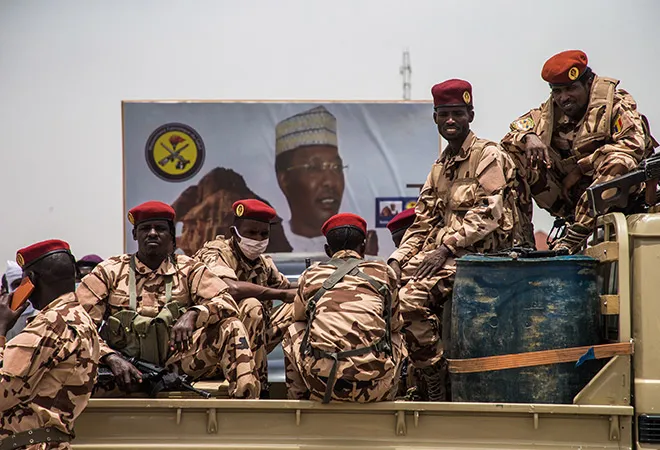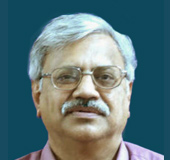-
CENTRES
Progammes & Centres
Location

Chad’s former President Idriss Déby Itno succumbed to injuries and died on 20 April 2021 while visiting military troops on the frontlines as the rebels were advancing into Chad from southern Libya. The Libyan-based rebel group namely, Front for Change and Concord in Chad (FACT), had been waging a persistent battle against Déby’s autocratic regime since 2016. In fact, with Sudanese support, as the head of the Patriotic Salvation Movement, Déby had taken over as President of Chad after overthrowing the brutal dictatorship of Hissène Habré in December 1990. With Déby’s demise, a more than three decades old regime has ended in Chad. States in Africa have had a history of autocratic regimes that worked for longer durations. During the last decade, like Déby, Muammar Gadaffi (1969-2011) of Libya, Robert Mugabe (1980-2017) of Zimbabwe, and Al Bashir (1989-2019) of Sudan had also controlled their respective states with an iron hand for decades.
Prior to his death, the Election Commission of Chad on the 11th of April had provisionally declared that Déby had won the sixth term as President by securing 79.3 percent of the votes cast. However, the pre-election period in Chad was characterised by a ruthless crackdown on protestors, violence and intimidation, opposition boycott, internet outages and procedural irregularities. After Déby’s death, the Military Council has taken over and appointed Déby’s 37-year-old son namely, Mohamat Idriss Déby or Kaka, as the head for 18 months. As per the requirement of the Constitution, the Speaker of the Parliament should have taken over after Déby’s death. Since there can be no dynastic devolution of power in Chad, the opposition is emboldened to oppose this unconstitutional seizure of power. The Peace and Security Council of the African Union (AU) has also expressed grave concern over a military take-over in Chad. Evidently, the present arrangement has pushed Chad into political turmoil.
The new regime has started mobilising internal and external resources to carry on with business before, hopefully, returning to constitutional democracy. One silver lining that appears to have boosted its morale has been the presence of President Macron of France who, along with African heads of the state, attended Déby’s funeral ceremony. During his visit, Macron asserted that “France will never let anyone, either today or tomorrow, challenge Chad’s stability and integrity”. Such unconditional support came because Déby was a long-term ally of France and the western world in their quest to combat the Islamic militants in the Sahel and the west African region. Irrespective of this symbolic gesture from Macron, stability may elude the present regime owing to Déby’s legacy.
Admittedly, it is not easy to govern a socially complex country such as Chad that is populated by Islamic and feudal nomads in the north and Christian and relatively progressive farmers in the south. As a strategically located landlocked state with rich mineral resources such as oil, gold and uranium, Chad shares borders with Sudan, Central African Republic (CAR), Cameroon, Niger, Nigeria, Mali, and Libya and its ethnic groups overlap with those of the neighbouring states. For instance, Zaghawa people constitute a Sahelian Muslim ethnic group that reside in eastern Chad, western Sudan, and southern Libya. Déby hailed from a Zaghawa ethnic group. Owing to ethnic diversities and social complexities, the post-colonial Chad could not build a cohesive society with a stable regime. As a former colonial power, France has had to intermittently intervene militarily in the internal affairs of Chad, at the request of Chadian rulers, since the late 1960s to restore stability and order. To repel the rebel groups that entered Chad from northern Libya, France had to carry airstrikes by deploying Mirage 2000 planes as late as in February 2019. Strangely, the autocratic regime of Déby offered relative political stability. By opting to support his regime, France had preferred stability over democracy and human rights.
In the process of managing governance, Déby drew support from his Zaghawa ethnic group. Consequently, members of his clan were appointed in security and intelligence-related services. Déby’s regime was corrupt and nepotistic. His sons, daughters and relatives were elevated to high positions even though the other members of his ethnic group resisted it. For instance, the Erdimini brothers launched a rebellion against their co-ethnic brothers. On the whole, the record of the Déby regime was replete with abuse of human rights. Besides, Chad is among the poorest countries, which stood at 187 among 189 countries in UN Human Development Index in 2019 and the infant mortality rate continued to be as high as 69.1 per 1000 live births in the same year. In spite of such a dismal performance, being a consummate army officer, Déby had been able to modernise and improve the military apparatus of the state. In the ultimate analysis, oil receipts, a repressive state apparatus, and western support had added to Déby’s staying power although the FACT rebel fighters have continued to oppose his rule.
The founder of the FACT rebel group, Mohamat Mahdi Ali, became a child rebel at the age of 14 in 1978. He has consistently rebelled against successive Chadian regimes. Mahadi Ali, in turn, was linked to the French socialist party and most notably associated with the Union of Forces for Democracy and Development (UFDD), led by Mohamat Nouri, who almost toppled the Déby regime in 2008. By 2015, Nouri was in exile in France, but he sent Mahadi Ali to Libya to retake control of UFDD rebel fighters, at the demand of anti-Gadaffi rebels based in Misrata known as Misratis. When Libya was enmeshed in the civil war, Chadian mercenaries were a part of Misratis-backed coalition called “Libyan dawn” in the west and Khalifa Hafter’s operation named “Dignity” in the east.
By 2016, Mahadi succeeded in taking over leadership of the FACT, which has support primarily from his Goran tribe. He appeared to be a divisive as well as uniting force among different splintered social groups. In spite of continued opposition from the FACT, opposition parties and trade union groups, Déby was able to promulgate the new constitution in 2018. Accordingly, the President will have a six-year term, instead of five years, with two terms as the limit. The provision was not applicable retroactively and, thereby, Déby could have continued as President until 2033 had he survived. After Déby’s death, the FACT is likely to get more popular support. For instance, the Union of Resistance Forces (UFR) mainly constituted by the Zaghawa ethnic group, is also supporting the FACT. By now, the FACT is being supported by dissident army groups, human rights groups, and opposition parties. The opposition parties have given a call to people to avoid any cooperation with the current regime and appealed to France not to interfere in the internal affairs of Chad.
However, France has high stakes in Chad. Owing to its geographic location across Sahel from the deserts of the Sahara to the Savanna in Sudan, Chad became France’s prime outpost to fight Islamic militants through its operation Barkhane. France has nearly 5,100 troops in Chad. It has also provided sophisticated military equipment to Chad. At the behest of France, Déby had placed a Chadian battalion in the Sahel’s Liptoao Gourma region to fight terrorists. In fact, being the hub of French military operations in the region, Chad provided its territory as well as troops to France in its operations. Thus, Chad cooperated with France’s operations in its bid to push back the Gadaffi regime in the Libyan civil war in 2011. Similarly, in 2013, roughly 2,000 Chadian forces had helped France in tracking down Al-Qaeda fighters in the deserts of northern Mali. The deployment of 1,500 Chadian troops this year on the tri-border theatre between Mali, Burkina Faso, and Niger was also intended to reorient the French troops in their mission to target terrorists linked to Al-Qaeda in Central Mali.
Despite the inclination of France to withdraw from the region, it has held on due to the possibility of a power vacuum that any withdrawal can cause. What is more, Chad has been an active participant in counterterrorism operations in Sahel and the Lake Chad Basin. It has contributed to the Multi-National Joint Task Force (MNJTF) constituted by Benin plus Lake Chad countries such as Cameroon, Niger, Nigeria, and Chad to fight Boko Haram, a terrorist outfit based in Nigeria. In addition, Chad is a significant player in the G5 Sahel task force constituted by Burkina Faso, Niger, Mauritania, and Mali, which is getting international support not only from France but from the United States as well as the European Union. Since Chad almost spent 30 percent of its budget on defence under Déby’s military leadership, it had succeeded in neutralising Boko Haram and Ansar Dine in northern Mali. Evidently, France and other western countries had no hesitation in backing the Déby regime.
Under the current circumstances, in order to manage governance smoothly, the present government has an unenviable task. Handling the wrath of massive political opposition through opposition parties, civil society and the FACT would keep it on the defensive while heavy reliance on France to manage governance would place Chad, once more, into France’s neo-colonial embrace and fuel greater opposition. How deftly the junior Déby grasps the gravity of the challenges to handle them effectively remains to be seen.
The views expressed above belong to the author(s). ORF research and analyses now available on Telegram! Click here to access our curated content — blogs, longforms and interviews.

Rajen Harshé is a founder and former Vice Chancellor of the Central University of Allahabad Prayagraj and former President of the G.B. Pant Social Science ...
Read More +